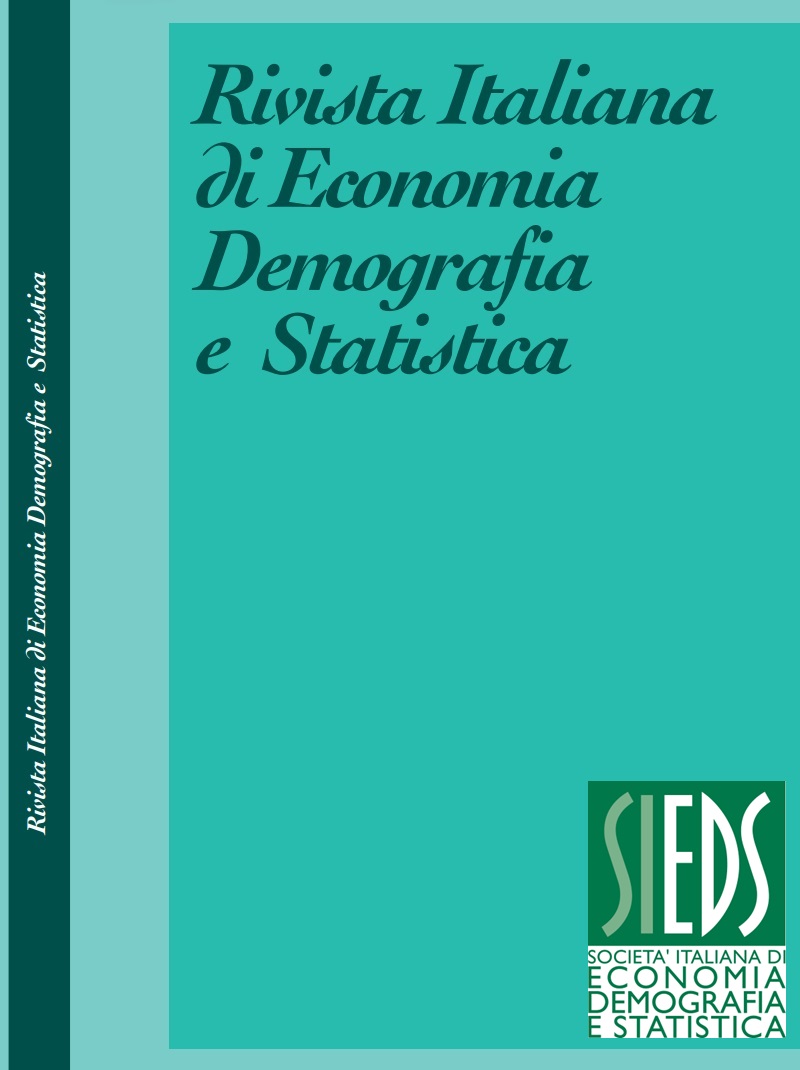Timing of parenthood and children’s educational outcomes: a new approach focusing on education as a positional good
DOI:
https://doi.org/10.71014/sieds.v79i2.353Keywords:
Maternal age, Parenthood timing, Education, Siblings fixed-effectsAbstract
As the timing of parenthood is steadily increasing in many Western countries, scholars have been interested in the consequences of later motherhood on children’s educational outcomes. Previous studies have shown that, in several contexts, the effect of maternal age on children’s education is positive. The mechanisms behind this positive effect, however, are unclear, since both the availability of higher socio-economic resources of older mothers and positive period trends in education may explain the gradient. In this study, I argue that to clarify the association between maternal age and children’s education, it is important to consider a relative measure of children’s education, focusing on education as a positional good. By means of the French survey Formation et Qualification Professionnelle (FQP) 2014-2015, and a siblings fixed-effects design, I estimate the effect of maternal age on children’s level of education measured in absolute (highest level of education attained) and relative (highest level attained relatively to others in the same age group) terms. Results show that, also in France, maternal age is positively associated with children’s – absolute – level of education. Still, the positive gradient disappears when children’s education is measured in relative terms. These findings support the argument according to which the positive gradient in children’s education by maternal age is substantially driven by educational expansion.References
BARCLAY K., MYRSKYLÄ M., 2016a. Advanced Maternal Age and Offspring Outcomes: Reproductive Aging and Counterbalancing Period Trends, Population and Development Review, Vol. 42, No. 1, pp. 69–94. DOI: https://doi.org/10.1111/j.1728-4457.2016.00105.x
BARCLAY K., MYRSKYLÄ M., 2016b. Online Comment and Rejoinder, Population and Development Review, Vol. 42, No. 4, pp. 711–711. DOI: https://doi.org/10.1111/padr.12025
BARTUS,T., MURINKÓ L., SZALMA I., SZÉL B., 2013. The effect of education on second births in Hungary, Demographic Research, Vol. 28, No. January, pp. 1–32. DOI: https://doi.org/10.4054/DemRes.2013.28.1
BREEN R., ERMISCH J., HELSKE S., 2019. Educational reproduction in Europe: A descriptive account, Demographic Research, Vol. 41, No. December. DOI: https://doi.org/10.4054/DemRes.2019.41.49
BREEN R., MÜLLER W., 2020. Education and intergenerational social mobility in Europe and the United States. Stanford, CA: Stanford University Press. DOI: https://doi.org/10.11126/stanford/9781503610163.001.0001
BUKODI E. GOLDTHORPE J.H., 2016. Educational attainment - relative or absolute - as a mediator of intergenerational class mobility in Britain, Research in Social Stratification and Mobility, Vol. 43, pp. 5–15. DOI: https://doi.org/10.1016/j.rssm.2015.01.003
CANTALINI S., GUETTO R., PANICHELLA N., 2020. Parental age at childbirth and children’s educational outcomes: evidence from upper-secondary schools in Italy, Genus, Vol. 76, No. 1, p. 8. DOI: https://doi.org/10.1186/s41118-020-00076-5
CHOI S., TAIJI R., CHEN M., MONDEN C., 2020. Cohort Trends in the Association Between Sibship Size and Educational Attainment in 26 Low-Fertility Countries, Demography, Vol. 57, No. 3, pp. 1035–1062. DOI: https://doi.org/10.1007/s13524-020-00885-5
CIGNO A., ERMISCH J., 1989. A microeconomic analysis of the timing of births, European Economic Review, Vol. 33, pp. 737–760. DOI: https://doi.org/10.1016/0014-2921(89)90023-8
COHEN P., 2014. Parental Age and Cognitive Disability among Children in the United States, Sociological Science, Vol. 1, pp. 102–110. DOI: https://doi.org/10.15195/v1.a8
FISHMAN S.H., MIN S. 2018. Maternal Age and Offspring’s Educational Attainment, Journal of Marriage and Family, Vol. 80, No. 4, pp. 853–870. DOI: https://doi.org/10.1111/jomf.12490
FORMATION ET QUALIFICATION PROFESSIONNELLE (FQP), 2015, INSEE [producers], ADISP [distributor].
GRÄTZ M., WIBORG Ø.N., 2024. Parental ages and the intergenerational transmission of education: evidence from Germany, Norway, and the United States, European Societies, pp. 1–28. DOI: https://doi.org/10.1080/14616696.2024.2310011
HIRSCH F., 1976. Social Limits to Growth. Harvard University Press. DOI: https://doi.org/10.4159/harvard.9780674497900
INSEE. 2015. Enquête Formation et Qualification Professionnelle 2014-2015, Méthodologie https://www.insee.fr/fr/metadonnees/source/operation/s1563/documentation-methodologique (accessed 17/07/2024).
KALMIJN M., KRAAYKAMP G., 2005. Late or later? A sibling analysis of the effect of maternal age on children’s schooling, Social Science Research, Vol. 34, No. 3, pp. 634–650. DOI: https://doi.org/10.1016/j.ssresearch.2004.04.008
KEIDING N., ANDERSEN P. K., 2016. Linear effects of maternal age and period trends cannot be distinguished, Population and Development Review. doi: 10. 1111/padr.12025.
KRAVDAL Ø. 2019. Taking birth year into account when analysing effects of maternal age on child health and other outcomes: The value of a multilevel-multiprocess model compared to a sibling model. Demographic Research, Vol. 40, pp. 1249–1290. DOI: https://doi.org/10.4054/DemRes.2019.40.43
MOOD C. 2010. Logistic Regression: Why We Cannot Do What We Think We Can Do, and What We Can Do About It, European Sociological Review, Vol. 26, No. 1, pp. 67–82. DOI: https://doi.org/10.1093/esr/jcp006
MYRSKYLÄ M., BARCLAY K., GOISIS A. 2017. Advantages of later motherhood. Der Gynäkologe, Vol. 50, No. 10, pp. 767–772. DOI: https://doi.org/10.1007/s00129-017-4124-1
POWELL B., STEELMAN L.C., CARINI R.M., 2006. Advancing Age, Advantaged Youth: Parental Age and the Transmission of Resources to Children, Social Forces, Vol. 84, No. 3, pp. 1359–1390. DOI: https://doi.org/10.1353/sof.2006.0064
TIMONEDA J.C., 2021. Estimating group fixed effects in panel data with a binary dependent variable: How the LPM outperforms logistic regression in rare events data, Social Science Research, Vol. 93, p. 102486. DOI: https://doi.org/10.1016/j.ssresearch.2020.102486
TRIVENTI M., PANICHELLA N., BALLARINO G., BARON, C., BERNARDI F., 2016. Education as a positional good: Implications for social inequalities in educational attainment in Italy, Research in Social Stratification and Mobility, Vol. 43, pp. 39–52. DOI: https://doi.org/10.1016/j.rssm.2015.04.002
Downloads
Published
Issue
Section
License
Copyright (c) 2025 Alessandra Trimarchi

This work is licensed under a Creative Commons Attribution 4.0 International License.



